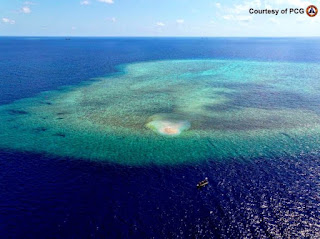Over
the weekend, Manila accused Beijing of attempting to create an “artificial
island” at Sabina Shoal, an unoccupied reef 75 nautical miles from Palawan
island.
The
Philippines said yesterday that it will bolster its presence at shoals and
islets in the South China Sea, to prevent China from carrying out land
reclamation activities on contested features.
The
claim comes after the Philippine Coast Guard (PCG) revealed that it had
deployed a ship to unoccupied Sabina Shoal “to monitor the supposed illegal
activities of China, creating ‘an artificial island'” on the submerged reefs,
according to a statement from President Ferdinand Marcos Jr.’s office.
PCG
spokesperson Commodore Jay Tarriela told a media forum on Saturday that there
had been “small-scale reclamation” of Sabina Shoal, and that China was “the
most probable actor.” He said that the coast guard had discovered piles of dead
and crushed coral that had been dumped on the sandbars of the shoal, which
Manila refers to as Escoda Shoal. “It has been observed that crushed corals
were dumped and it is highly likely that the maritime features were altered,”
Tarriela said in a separate post on X (formerly Twitter).
Addressing
another forum in Manila yesterday, Tarriela said that the agency was committed
to sustaining a presence in the area to make sure it was able to prevent China
“from carrying out a successful reclamation in Sabina Shoal.” In the mid-2010s,
China successfully carried out large-scale land reclamation on the features
that it occupies in the Spratly Islands, turning some into artificial islands
equipped with airstrips, radar installations, and government buildings.
Manila
has a strong incentive to prevent China from turning Sabina Shoal into a
similar island fortress. The shoal sits well to the east of China’s seven other
Spratly Island features, just 75 nautical miles from the coast of Palawan, the
Philippines’ westernmost island. The shoal is also the rendezvous point for
vessels carrying out resupply missions to Second Thomas Shoal, a
Philippine-occupied submerged reef around 36 nautical miles to the west that
has become a significant flashpoint of China-Philippines tensions.
Over
the past 18 months, the China Coast Guard (CCG) has made increasingly forceful
attempts to block Philippine attempts to resupply its forces at Second Thomas
Shoal, which are stationed aboard a grounded warship. During recent stand-offs
it has rammed and fired high-pressure water cannons at PCG vessels and
Philippine Navy-commissioned supply boats, causing some considerable damage.
This has since spun out into a diplomatic spat in which the two sides have
traded frequent accusations of double-dealing and bad faith, to which there
appears to be currently no resolution.
Sure
enough, China’s Foreign Ministry yesterday denied the claim that it had begun
reclamation at Sabina Shoal, dismissing the accusation as “groundless and pure
rumor.”
“Recently,
the Philippine side has repeatedly spread rumors, deliberately smeared China
and attempted to mislead the international community, which is futile,” a
spokesperson Wang Wenbin told a press briefing in Beijing, urging the country
to “return to the right track of properly settling maritime disputes through
negotiation and consultation.”
With
tensions increasing, the Philippines also said yesterday that it will extend
its vigilance to all of the 11 features that it occupies in the Spratly
Islands, as well as the numerous other unoccupied features, such as Sabina
Shoal, lying inside its EEZ. Also yesterday, Jonathan Malaya, spokesperson of
the National Security Council (NSC), said that NSC chief Eduardo Año had
ordered a tighter guard at locations within Manila’s EEZ, Reuters reported.
“No
one will guard (these locations) except us,” Malaya said in a television
interview. “It is our responsibility under international law to guard (them)
and ensure that the environment there would not be damaged and that there won’t
be reclamation activities.”
These
comments on the same day that the Philippines announced that it would launch an
official investigation of allegations that Chinese embassy staff in Manila had
engaged in a disinformation campaign related to the South China Sea disputes.
The
investigation will center on a recording released by the embassy last week,
purportedly documenting a conversation between an unnamed Chinese diplomat and
Philippine Vice Adm. Alberto Carlos, chief of the Palawan-based Western Command
of the Armed Forces of the Philippines, referring to the management of tensions
at Second Thomas Shoal. The recording was released to support China’s claim
that the Philippines had broached an informal agreement designed to lower
temperatures at the shoal.
Late
last week, NSA chief Año urged the government to expel the Chinese embassy
staffers for allegedly recording a phone conversation, in possible breach of
Philippine law. The Department of Foreign Affairs subsequently said it would
“look into any reports of illegal and unlawful activities by diplomatic
officials, and undertake necessary action in line with existing laws and
regulations.”










